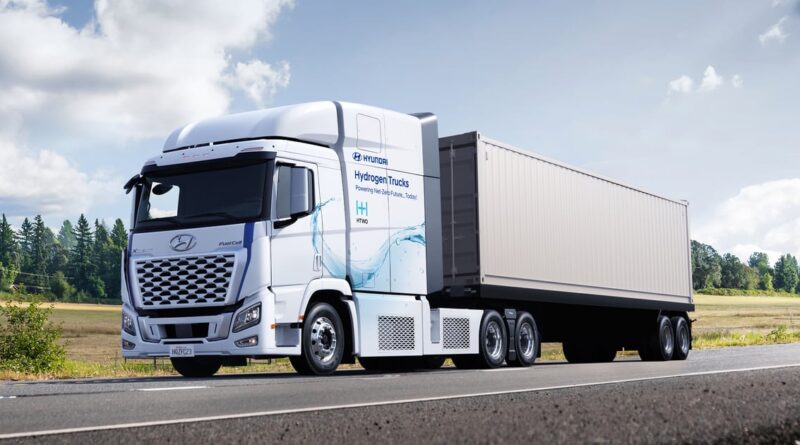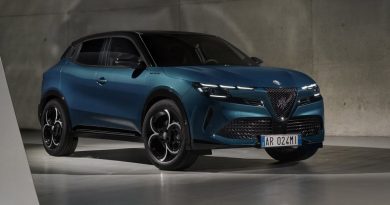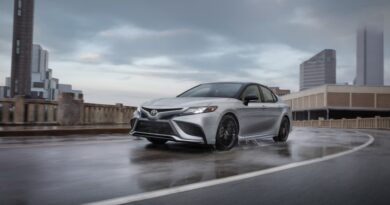Hyundai launches U.S. hydrogen fuel cell truck strategy
ANAHEIM, Calif. — Leveraging its experience offering fuel cell passenger vehicles, Hyundai Motor Co. plans to offer a hydrogen-powered heavy-duty truck in the U.S. this year.
Hyundai unveiled the production version of its Xcient Fuel Cell Class 8 truck on Tuesday at the ACT Expo just a block from Disneyland in California.
“Our hydrogen fuel cell technology has pioneered the industry with a real-world proven track record of its efficiency and durability,” said Ken Ramirez, the Hyundai executive vice president who heads the company’s global commercial vehicle and hydrogen fuel cell business.
The South Korean automaker further outlined its business plan for distributing the truck and tapping into a fueling infrastructure.
Hyundai launched the first version of the Xcient in 2020 in Switzerland, hauling goods for several large retailers. It now operates in Germany, Israel, South Korea and New Zealand, accumulating more than 4 million operating miles. Hyundai said it is the only heavy-duty fuel cell electric model with a proven record of real-world application and technological reliability.
Hyundai will deploy 30 of the trucks in northern California this year as part of the Zero-Emission Regional Truck Operations with Fuel Cell Electric Trucks project, a public-private collaboration that intends to build a hydrogen refueling station and deliver economic and health benefits to a disadvantaged community in Oakland. The first delivery of the truck is planned for June.
The Xcient truck, including a loaded trailer and full hydrogen tanks, is rated to carry a gross weight of 82,000 pounds, making it about the equivalent of a traditional diesel big rig. It uses two stacks adapted from Hyundai’s Nexo fuel cell crossover with adjustments to fit commercial vehicle usage.
The system converts hydrogen to electricity to run the powertrain. Hyundai said the truck would have a range of about 450 miles with a full load. The powertrain generates 469 hp and 1,650 pound-feet of torque.
But it will require a significant fueling network to work in the U.S. There is almost none. The nation has about 60 hydrogen fueling stations, all in California, according to the Department of Energy. The freight and logistics industry will need hundreds more across the interstate highway system to deploy the technology.
Hyundai said it is starting work on that issue.
In the regions where the Xcient currently operates, the company offers hydrogen refueling and truck maintenance, said Mark Freymueller, Hyundai’s head of commercial vehicle business innovation.
“Here in the U.S., we plan to do the same since each case needs its tailor-made service approach, especially during the transition phase from traditional to hydrogen,” Freymueller said.
Additionally, Hyundai said it is working to develop a clean hydrogen ecosystem through a waste-to-energy process that relies on biogas extracted from organic matter such as food waste, livestock manure and sewage sludge. It has a demonstration project with a local government entity in South Korea.
The automaker, part of a large industrial group, said the company is looking at how hydrogen energy could apply to many transportation modes, including light and commercial vehicles, ships and aircraft.
“We now look beyond mobility toward an integrated hydrogen ecosystem, from production of hydrogen to its storage, transport and delivery,” Ramirez said.
Others also are looking at hydrogen fuel cells to power heavy-duty trucks.
Toyota North America said last month that it was moving forward with repurposing technology from its Mirai fuel cell sedan to create a hydrogen power kit for heavy-duty trucks. The automaker announced it would start producing fuel cell modules for hydrogen-powered commercial trucks at its Kentucky plant this year.
Paccar, the maker of Kenworth and Peterbilt trucks, said at the ACT Expo, which stands for Advanced Clean Transportation, that it would offer the kits in some of its models.
Elsewhere, Nikola Corp., a Phoenix startup, said it has orders for 100 Class 8 Tre hydrogen fuel cell trucks and plans to begin deliveries in the fourth quarter of this year. Nikola displayed its fuel cell truck at the expo.
There, it also announced an agreement with Voltera to build a North American network of hydrogen fueling stations that will be available to all commercial trucks. Voltera will construct and operate the stations at “strategic” locations, while Nikola will serve as the hydrogen supplier.
And Cellcentric, a 50-50 joint venture between Daimler Truck Group, owner of the Freightliner brand, and Volvo Group is also developing a fuel cell powertrain for heavy-duty trucks. Cellcentric also showed its fuel cell system at the expo this week.
Quantron, a German company, showed its fuel cell semitractor. The company said it would have a range of about 750 miles.
The trucking industry sees hydrogen technology as potentially outperforming battery-electric options for long-haul freight. The hydrogen-electric powertrain and fuel tanks generally weigh less than the heavy batteries a battery-electric truck would need to travel long distances. Additionally, hydrogen fueling takes about the same time as filling up a diesel truck and wouldn’t be the same drag on driving efficiency that long battery charging sessions exact.
Hyundai executives said moves by the Biden administration to help fund zero-emission transportation and hydrogen infrastructure would create a more favorable environment for fuel cell trucks.
For example, the 2021 Infrastructure Investment and Jobs Act earmarked $8 billion to create a national network of hydrogen hubs. The 2022 Inflation Reduction Act provides tax credits for clean hydrogen production, creates financial incentives for hydrogen production and offers a $40,000 credit for heavy-duty zero-emission commercial vehicles such as fuel cell trucks. States such as California have additional incentives.
California regulators last week voted to begin the phaseout of diesel trucks next year and end combustion truck sales in 2036.
Source : Autonews.com




